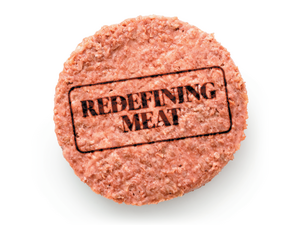
Air Protein, a San Leandro startup that's creating protein from particles in the air, has more than tripled its total funding and partnered with one of the world's largest crop producers and traders.
The deal with Chicago-based ADM (NYSE: ADM) will further the research, development and production of its alternative protein and comes with an undisclosed infusion from the company's investment arm, ADM Ventures.
Air Protein said its total raise was $75 million with investments from GV, Barclays and the Ford Family Foundation in addition to ADM. That brings its total funding to $107 million.
The newest round was a simple agreement for future equity, or SAFE, round and comes a little more than two years after the company raised a $32 million Series A. Air Protein declined to provide its current valuation but it was valued at more than $100 million in 2020, according to PitchBook.
ADM Ventures, Barclays and GV also led the previous round, which also included Fearless Fund, GingerBread Capital, Kapor Capital, Park Bench Capital, Plum Alley Investments, Primera Capital, Radicle Impact and Unreasonable Group.
Air Protein and ADM will also exclusively work together to build the startup's first commercial production facility, and although the companies are not announcing more details yet, it will most likely not be located in San Leandro, where Air Protein is headquartered, CEO Lisa Dyson told me.
Dyson co-founded Air Protein with Chief Science Officer John Reed in 2019, when they spun it out from her previous startup, Kiverdi. The startup currently has more than 70 employees.
Air Protein uses a process similar to vertical farming, but rather than using seed crops, it takes elements from the air — oxygen, nitrogen and carbon dioxide, specifically — and uses a fermentation process akin to yogurt and cheese production to create a protein-rich flour than can be turned into consumer-grade products.
"We are building this new way of making protein landlessly, landless agriculture, as it were, and we're excited about being able to create food in a way that's decoupled from traditional supply chains so that we can grow food anywhere, in any climates, rain or shine, day or night, and have really high yields, as well," Dyson said, without the need for arable land.
ADM will also collaborate with Air Protein on developing nutritional and flavor profiles for its alternative protein products.
"We're excited about having a global partner who has that broad reach to work with us to ensure that we're making the right types of ingredients for everyday food that meets nutritional, sustainability and other requirements," Dyson said.

The company currently sources its oxygen, nitrogen and carbon dioxide from other suppliers, but the long-term goal is to be able to tap into all of those elements locally, anywhere in the world, with technologies like direct air carbon capture.
Venture capital funding for indoor farming plummeted 70% in the first three months of the year compared with the previous quarter, and is down more than 90% compared to the same period in 2022, according to a PitchBook report, with major headwinds that include rising energy costs and interest rates.
Climate tech funding has also slowed down, according to PitchBook, though much less steeply, with venture capital firms investing 36% less capital into climate startups at the beginning of the year compared to the quarter.
"You probably would want to place us more in climate tech," Dyson said, because "we're able to use carbon dioxide as an input" and create a carbon-negative ingredient. "That's really where our sweet spot is."
Air Protein says it will have the capacity to remove 1.5 million tons of carbon from the atmosphere over a 10-year period, Dyson said. She also anticipates that the company will be eligible for federal incentives through the Inflation Reduction Act.
The company also said that its products have been designated "generally regarded as safe," or GRAS, through an independent review process.
Air Protein couldn't provide an exact timeline for when its first consumer product will be available, but it's currently seeking a "no comment" review of the GRAS status from the Food and Drug Administration, which will allow the company to proceed with its commercial launch plans.
Its first consumer products will also likely be priced lower than other proteins on the market, Dyson said, and while the company hasn't announced what that first product will be, it has been developing chicken and scallop alternatives.
Air Protein was also selected as one of Bay Area Inno's Startups to Watch in 2022.








